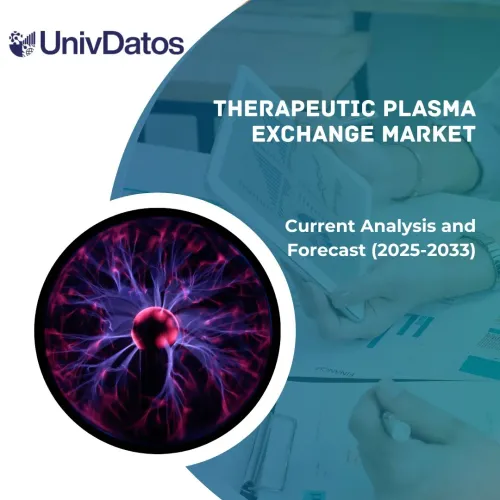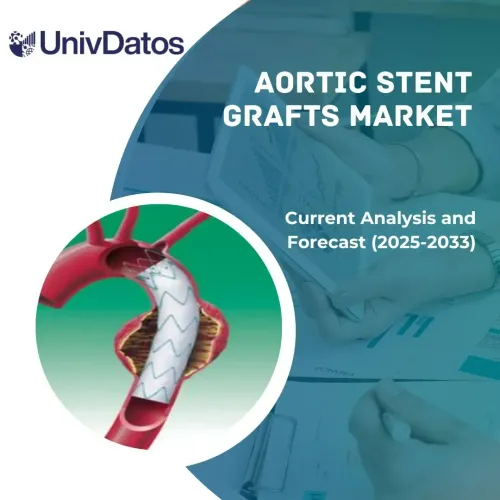- Home
- About Us
- Industry
- Services
- Reading
- Contact Us
Embolotherapy Market: Current Analysis and Forecast (2025-2033)
Emphasis on Product Type (Embolic Agents and Support Devices); Procedure (Transcatheter Arterial Embolization [TAE], Transarterial Radioembolization/Selective Internal Radiation Therapy [TARE/SIRT], and Transarterial Chemoembolization [TACE]); Indication (Oncology, Vascular Disease, Others); End-User (Hospitals and Clinics, Ambulatory Surgery Centres, Others); and Region/Country
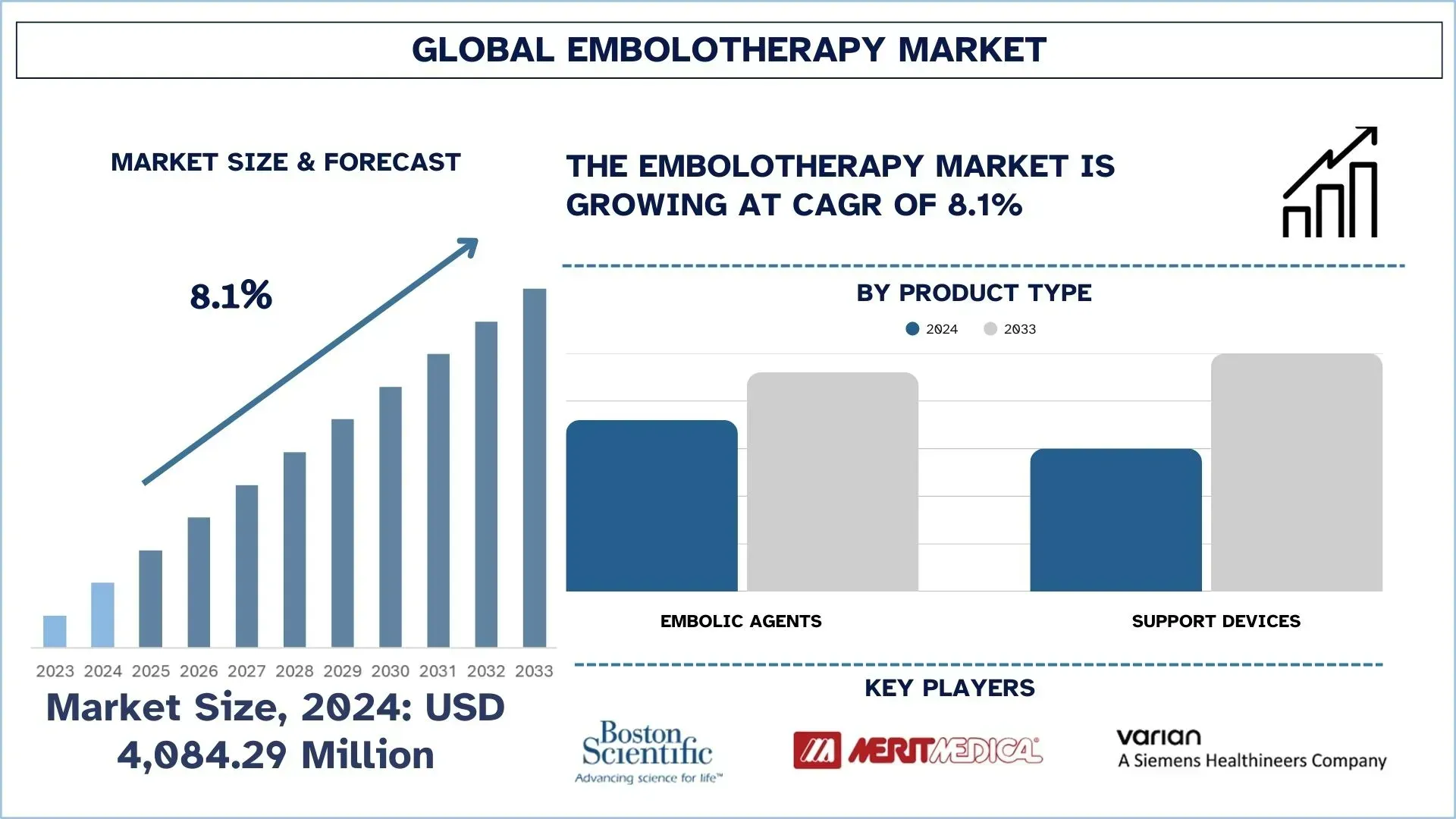
Global Embolotherapy Market Size & Forecast
The Global Embolotherapy Market was valued at USD 4,084.29 million in 2024 and is expected to grow at a strong CAGR of around 8.1% during the forecast period (2025-2033F), driven by the rising prevalence of cancer, vascular diseases, and other chronic conditions requiring minimally invasive procedures, coupled with technological advancements in embolic agents and devices that enhance safety and efficacy.
Embolotherapy Market Analysis
Embolotherapy is an intervention method in medicine that involves purposefully blocking blood vessels to treat a number of conditions, with the majority being cancers, vascular malformations, and uncontrollable bleeding. It is performed by interventional radiologists under imaging guidance and involves the injection of embolic agents (microspheres, coils, plugs, or liquid) into a target site so as to limit blood flow. It may reduce or kill tumors by decreasing blood flow to the tumor, preventing bleeding, or slowing blood flow prior to surgery.
The embolotherapy market is increasing because the target diseases, like liver cancer, uterine fibroids, and arteriovenous malformations, are also increasing. For instance, the WHO has stated that liver cancer is the 6th most common cancer worldwide. Liver cancer, uterine fibroids, and arteriovenous malformations are increasingly being treated using minimally invasive procedures. The evolution of embolic agents is on the rise, with the introduction of drug-eluting beads and bioresorbable materials, as well as liquid embolic agents, improving treatment precision, safety, and outcomes, thereby increasing adoption rates. Increase in demand is further motivated by the desire of patients to favor those procedures that have shorter recovery periods and lower complication rates. Moreover, the growth of interventional radiology centers, favorable reimbursement policies in developed countries, and increasing investments in healthcare in emerging markets are driving the market.
Global Embolotherapy Market Trends
This section discusses the key market trends that are influencing the various segments of the global embolotherapy market, as found by our team of research experts.
Shift toward drug-eluting and radioembolization therapies
The transition to drug-eluting and radioembolization therapies is a significant trend in the embolotherapy market, driven by the fact that these therapies offer targeted treatments with higher efficacy and fewer side effects. Drug-eluting beads are capable of releasing chemotherapeutic agents at the site of the tumor and also block blood flow, thereby increasing local drug concentration and reducing systemic toxicity. Similarly, radioembolization introduces radioactive microspheres, such as Yttrium-90, into the tumor to irradiate it internally with high accuracy. Additionally, these methods are also useful in the treatment of liver tumors and metastatic tumors, improving the patient's prognosis and reducing the recovery period. This therapeutic transition is being accelerated by growing clinical evidence, technological advancements, and increasing adoption by physicians.
Embolotherapy Industry Segmentation
This section provides an analysis of the key trends in each segment of the global embolotherapy market report, along with forecasts at the global, regional, and country levels for 2025-2033.
The Embolic Agents Market Dominates the Global Embolotherapy Market
Based on the product type category, the market is categorized into embolic agents and support devices. Among these, the embolic agents market holds the highest market share in the embolotherapy market, due to their broad utilization in procedures such as TACE, TARE, and uterine artery embolization, along with the broad range of available coils, particles, and liquid embolic to meet the clinical requirements of various procedures. However, in the future, the support devices market, including microcatheters, guidewires, and delivery systems, will advance at a higher rate, driven by technological innovations, the increasing use of minimally invasive procedures, and the need for precision in complex procedures. For instance, in July 2025, Embolx, which is a leader in advanced microcatheters for targeted embolization procedures, announced the release of its next-generation Sniper G3 Balloon Occlusion Microcatheter. Sniper G3 has a better tracking ability and less preparation time, making its pre-procedure setup time much less.
The Oncology Segment Dominates the Global Embolotherapy Market.
Based on the indication category, the market is segmented into oncology, vascular disease, and others. Among these, the oncology segment holds the largest market share due to the growing popularity of embolotherapy procedures, such as TACE and TARE, in the treatment of hepatocellular carcinoma and other metastatic cancers. However, the vascular disease segment is expected to grow significantly in the forecasted period, due to the rising incidence of aneurysms, arteriovenous malformations, and peripheral vascular disorders.
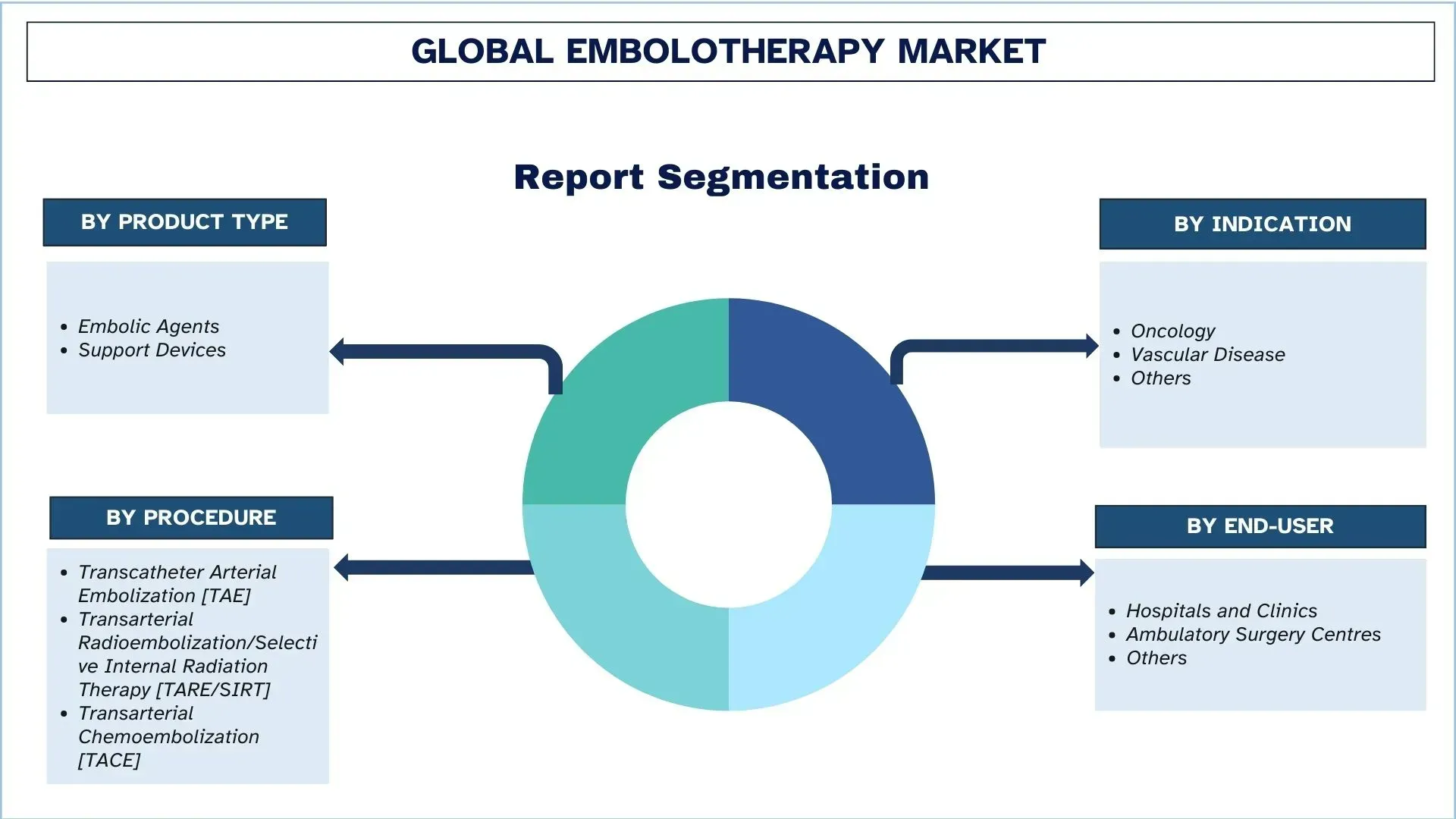
North America holds the largest market share in the global Embolotherapy market
North America holds the largest market share in the global embolotherapy market due to its robust healthcare infrastructure, widespread adoption of minimally invasive surgery, and strong presence of major medical equipment vendors. The region enjoys the benefits of good reimbursement policies, a high level of awareness among patients and medical care providers, and a huge number of experienced interventional radiologists. The demand for embolotherapy remains constant due to the high rates of occurrence of liver cancer, uterine fibroids, and vascular disorders. Furthermore, technological advancements, robust regulations in support of product approval, and the consolidation of image-guided therapies further enhance North America's dominance in the global market.
The United States held a Dominant share of the North America Embolotherapy Market in 2024
The United States dominates the embolotherapy market in North America due to its highly developed healthcare system, pioneering application of new methods in interventional radiology, and the presence of major medical device manufacturers. The growing prevalence rate of liver cancer, uterine fibroids, and other vascular disorders, along with the availability of many skilled interventional radiologists, contributed to the high demand for embolotherapy procedures. Additionally, market growth is favorable due to supportive reimbursement policies, strong cancer screening programs, and a significant insured population. Moreover, the high frequency of the FDA approvals and launch of new products, as well as the emphasis on the outpatient-based, minimally invasive approaches, supports the leadership of the United States in the area.
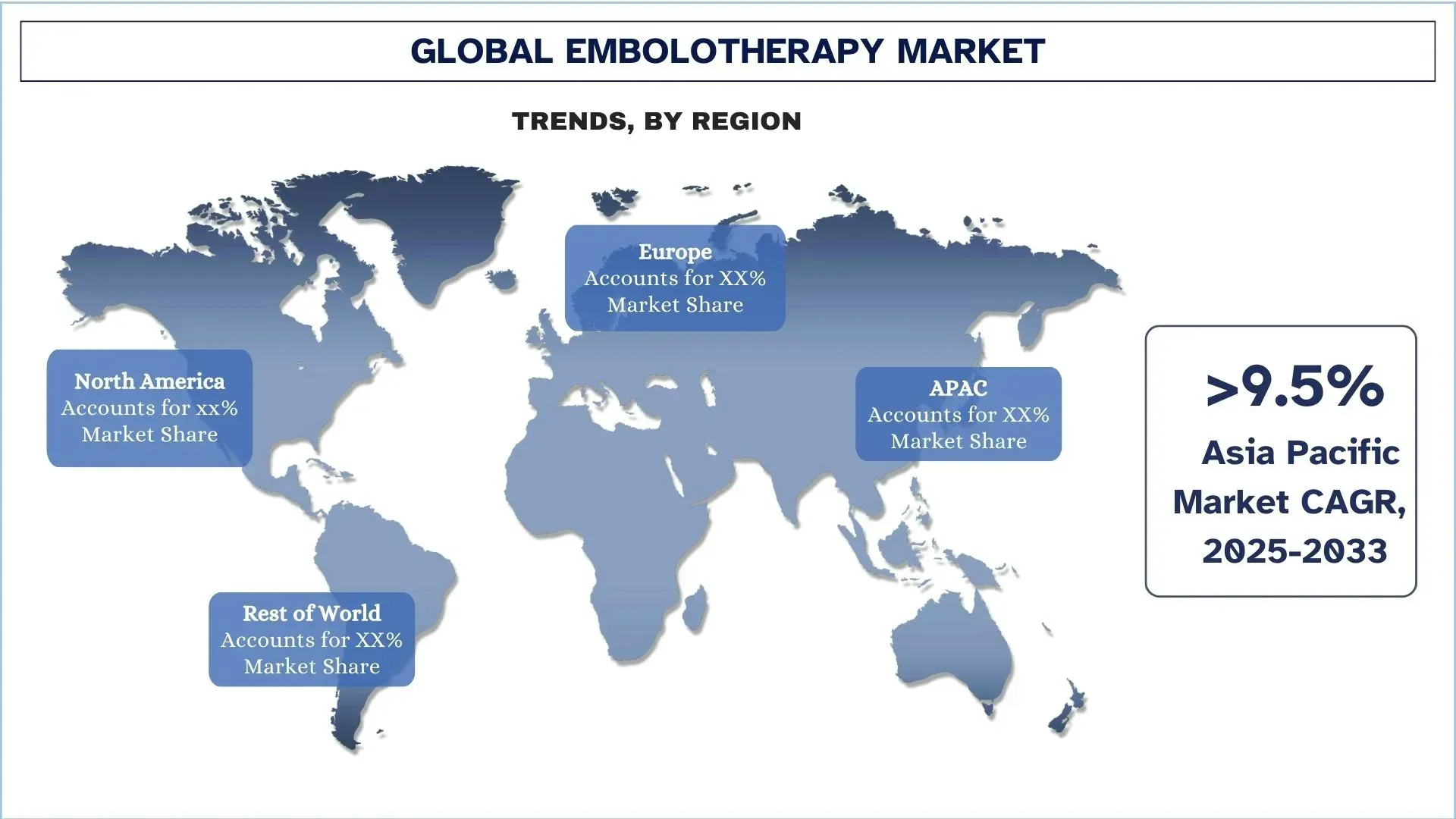
Embolotherapy Industry Competitive Landscape
The global embolotherapy market is competitive, with several global and international market players. The key players are adopting different growth strategies to enhance their market presence, such as partnerships, agreements, collaborations, geographical expansions, and mergers and acquisitions.
Top Embolotherapy Market Companies
Some of the major players in the market include Boston Scientific Corporation, Merit Medical, Varian (Siemens Healthineers company), Darling Ingredients Inc., Terumo Medical Corporation, Stryker, Medtronic Inc., Kaneka Corporation, Instylla, Inc., and Acandis GmbH.
Recent Developments in the Embolotherapy Market
In August 2025, Instylla, Inc., which is a privately held company involved in the development of novel resorbable embolic for peripheral vascular embolization, announced premarket approval (PMA) from the U.S. Food and Drug Administration (FDA) for the company’s flagship product Embrace™ Hydrogel Embolic System. This latest launch, “Embrace HES,” has been approved for the embolization of hyper-vascular tumors in peripheral arteries ≤ 5mm.
In December 2023, Terumo Medical Corporation announced the launch of its new AZUR HydroPack Peripheral Coil System in the United States. The AZUR HydroPack Coil System was introduced as a soft, universal-shaped platinum and hydrogel coil designed to locate and fill empty space within the vessel. It was highlighted as the only packing coil utilizing proprietary hydrogel technology to form a gel core for mechanical occlusion, a distinctive feature of AZUR peripheral coils.
Global Embolotherapy Market Report Coverage
Report Attribute | Details |
Base year | 2024 |
Forecast period | 2025-2033 |
Growth momentum | Accelerate at a CAGR of 8.1% |
Market size 2024 | USD 4,084.29 million |
Regional analysis | North America, Europe, APAC, Rest of the World |
Major contributing region | The Asia-Pacific region is expected to dominate the market during the forecast period. |
Key countries covered | U.S., Canada, Germany, U.K., Spain, Italy, France, China, Japan, and India. |
Companies profiled | Boston Scientific Corporation, Merit Medical, Varian (Siemens Healthineers company), Darling Ingredients Inc., Terumo Medical Corporation, Stryker, Medtronic Inc., Kaneka Corporation, Instylla, Inc., and Acandis GmbH. |
Report Scope | Market Trends, Drivers, and Restraints; Revenue Estimation and Forecast; Segmentation Analysis; Demand and Supply Side Analysis; Competitive Landscape; Company Profiling |
Segments Covered | By Product Type, By Procedure, By Indication, By End-User, and By Region/Country |
Reasons to Buy the Embolotherapy Market Report:
The study includes market sizing and forecasting analysis confirmed by authenticated key industry experts.
The report briefly reviews overall industry performance at a glance.
The report covers an in-depth analysis of prominent industry peers, primarily focusing on key business financials, type portfolios, expansion strategies, and recent developments.
Detailed examination of drivers, restraints, key trends, and opportunities prevailing in the industry.
The study comprehensively covers the market across different segments.
Deep dive regional level analysis of the industry.
Customization Options:
The global embolotherapy market can further be customized as per the requirements or any other market segment. Besides this, UnivDatos understands that you may have your own business needs; hence, feel free to contact us to get a report that completely suits your requirements.
Table of Content
Research Methodology for the Global Embolotherapy Market Analysis (2023-2033)
We analyzed the historical market, estimated the current market, and forecasted the future market of the global embolotherapy market to assess its application in major regions worldwide. We conducted exhaustive secondary research to gather historical market data and estimate the current market size. To validate these insights, we carefully reviewed numerous findings and assumptions. Additionally, we conducted in-depth primary interviews with industry experts across the embolotherapy value chain. After validating market figures through these interviews, we used both top-down and bottom-up approaches to forecast the overall market size. We then employed market breakdown and data triangulation methods to estimate and analyze the market size of industry segments and sub-segments.
Market Engineering
We employed the data triangulation technique to finalize the overall market estimation and derive precise statistical numbers for each segment and sub-segment of the global embolotherapy market. We split the data into several segments and sub-segments by analyzing various parameters and trends, including product type, procedure, indication, end-user, and regions within the global embolotherapy market.
The Main Objective of the Global Embolotherapy Market Study
The study identifies current and future trends in the global embolotherapy market, providing strategic insights for investors. It highlights regional market attractiveness, enabling industry participants to tap into untapped markets and gain a first-mover advantage. Other quantitative goals of the studies include:
Market Size Analysis: Assess the current and forecast market size of the global embolotherapy market and its segments in terms of value (USD).
Embolotherapy Market Segmentation: Segments in the study include areas of product type, procedure, indication, end-user, and region.
Regulatory Framework & Value Chain Analysis: Examine the regulatory framework, value chain, customer behavior, and competitive landscape of the embolotherapy industry.
Regional Analysis: Conduct a detailed regional analysis for key areas such as Asia Pacific, Europe, North America, and the Rest of the World.
Company Profiles & Growth Strategies: Company profiles of the embolotherapy market and the growth strategies adopted by the market players to sustain the fast-growing market.
Frequently Asked Questions FAQs
Q1: What is the global embolotherapy market’s current market size and growth potential?
As of 2024, the global embolotherapy market is valued at USD 4,084.29 million. The market is expected to grow at a strong CAGR of 8.1% between 2025 and 2033, driven by increasing demand for minimally invasive procedures and rising cases of cancer and vascular diseases.
Q2: Which segment has the largest share of the global embolotherapy market by product type category?
The embolic agents segment holds the largest market share, owing to their wide usage in procedures like TACE, TARE, and uterine artery embolization. Their proven clinical effectiveness and availability in multiple forms (coils, microspheres, liquid embolic) make them the dominant choice.
Q3: What are the driving factors for the growth of the global embolotherapy market?
Top growth drivers of the embolotherapy market include:
• Rising prevalence of liver cancer, uterine fibroids, and arteriovenous malformations (AVMs).
• Growing preference for minimally invasive treatments over traditional surgeries.
• Continuous advancements in embolic materials and delivery devices.
Q4: What are the emerging technologies and trends in the global embolotherapy market?
Emerging trends in the embolotherapy market include:
• Increasing adoption of drug-eluting beads and radioembolization therapies.
• Integration of 3D navigation systems and AI-based imaging to improve accuracy and outcomes in embolization procedures.
Q5: What are the key challenges in the global embolotherapy market?
Key challenges in the embolotherapy market include:
• High cost of embolotherapy procedures and advanced devices.
• Shortage of skilled interventional radiologists, particularly in developing regions.
Q6: Which region dominates the global embolotherapy market?
North America currently dominates the global embolotherapy market, supported by advanced healthcare infrastructure, strong adoption of interventional radiology procedures, favorable reimbursement policies, and the presence of leading market players.
Q7: Who are the key competitors in the global embolotherapy market?
Top players in the embolotherapy industry include:
• Boston Scientific Corporation
• Merit Medical
• Varian (Siemens Healthineers Company)
• Darling Ingredients Inc.
• Terumo Medical Corporation
• Stryker
• Medtronic Inc.
• Kaneka Corporation
• Instylla, Inc.
• Acandis GmbH
Q8: What are the investment opportunities and growth prospects in the embolotherapy market?
The embolotherapy market offers strong investment opportunities in emerging technologies like drug-eluting beads, radioembolization, and AI-guided procedures. The rapid adoption in the Asia-Pacific and Latin America, combined with expanding reimbursement support, makes these regions highly attractive for investors and new entrants.
Q9: How is the regulatory landscape impacting the embolotherapy market’s growth?
Regulatory bodies such as the FDA and EMA play a crucial role in shaping the embolotherapy market. Timely product approvals, evolving reimbursement policies, and stricter safety standards are driving innovation while also influencing entry barriers and adoption rates worldwide.
Related Reports
Customers who bought this item also bought





